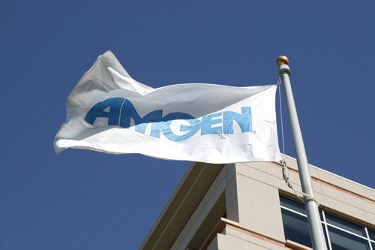Amgen’s Lumakras shows promise in phase 3 lung cancer study
June 8, 2023
Source: drugdu
 300
300

Amgen has shared positive results from a late-stage study evaluating its KRAS inhibitor, Lumakras (sotorasib), in certain lung cancer patients.
The phase 3 CodeBreaK 200 trial compared Lumakras to docetaxel chemotherapy in patients with previously treated, locally advanced and unresectable or metastatic KRAS G12C-mutated non-small cell lung cancer (NSCLC).
New data from the trial was presented at the American Society of Clinical Oncology (ASCO) annual meeting.
NSCLC represents up to 85% of all lung cancer diagnoses. KRAS G12C is the most common KRAS mutation in NSCLC, Amgen reports, and patients with this mutation whose first-line treatment has failed face limited options.
According to data from a post-hoc analysis of CodeBreaK 200, which included NSCLC patients with treated or stable central nervous system (CNS) lesions at baseline, Lumakras was associated with a delayed time to CNS progression and longer CNS progression-free survival (PFS) compared with docetaxel.
Additionally, an assessment of CNS tumour shrinkage following treatment was more than double in Lumakras-treated patients compared to those receiving docetaxel, Amgen said.
Lumakras also showed improved PFS, irrespective of PD-L1 expression level, and retained PFS benefit versus docetaxel across key co-alteration subgroups.
"CNS metastases are an unfortunately common complication of KRAS G12C-mutated advanced NSCLC, occurring in about 30 to 40% of patients," explained Melissa Johnson, director of lung cancer research, Sarah Cannon Research Institute at Tennessee Oncology.
"In this post-hoc analysis from CodeBreaK 200, [Lumakras] delayed CNS PFS by more than five months and is a potential clinically meaningful benefit for second-line NSCLC patients with KRAS G12C mutations," Johnson said.
The company also presented new data from the CodeBreaK 101 phase 1b study, which evaluated Lumakras in combination with Vectibix (panitumumab) and a chemotherapy regimen in patients with previously-treated KRAS G12C-mutated metastatic colorectal cancer (mCRC).
Among 42 patients evaluable for response, confirmed overall response rate was 55% and disease control rate was 93%, with responses observed regardless of the number of prior lines of therapy and regardless of progression on prior irinotecan-based therapy.
David Reese, executive vice president of research and development at Amgen, said: "This data presented at ASCO underscores the clinical importance of Lumakras, including the only randomised trial of a KRAS G12C inhibitor to show higher intracranial activity compared to chemotherapy, along with data validating our combination treatment approach in mCRC, where new precision medicine strategies are desperately needed."
Reference:
https://www.pmlive.com/pharma_news/amgens_lumakras_shows_promise_in_phase_3_lung_cancer_study_1492434
Read more on
- The first subject has been dosed in the Phase I clinical trial of Yuandong Bio’s EP-0210 monoclonal antibody injection. February 10, 2026
- Clinical trial of recombinant herpes zoster ZFA01 adjuvant vaccine (CHO cells) approved February 10, 2026
- Heyu Pharmaceuticals’ FGFR4 inhibitor ipagoglottinib has received Fast Track designation from the FDA for the treatment of advanced HCC patients with FGF19 overexpression who have been treated with ICIs and mTKIs. February 10, 2026
- Sanofi’s “Rilzabrutinib” has been recognized as a Breakthrough Therapy in the United States and an Orphan Drug in Japan, and has applied for marketing approval in China. February 10, 2026
- Domestically developed blockbuster ADC approved for new indication February 10, 2026
your submission has already been received.
OK
Subscribe
Please enter a valid Email address!
Submit
The most relevant industry news & insight will be sent to you every two weeks.



